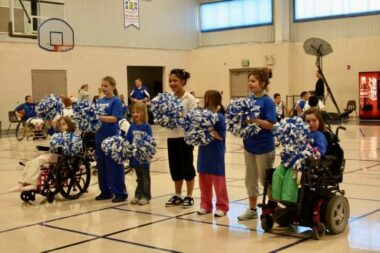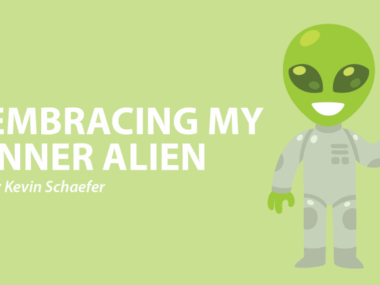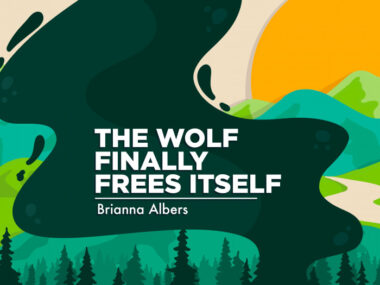The challenges of cheering on others while living with SMA
Being a cheerleader is rewarding, but it also comes with difficulties
Written by |

I’ve been blessed to grow up in a city that’s mindful of accessibility and inclusion, which means there’s an abundance of accessible activities to participate in. Throughout my life, this has provided opportunities for me and my family to be involved in a variety of programs and services, including a large disability center where I’ve spent countless hours receiving therapy, creating art, playing games, volunteering, and building friendships.
That center is also home to many adaptive sports teams, including power soccer, which is a popular choice in the SMA community. Over the years, I’ve been invited to join our local team many times. However, my interests aren’t in playing sports, but I greatly appreciate being asked and that I’m thought of by my peers who do play.
I’ve always loved being a supporter, though, so as a kid, I’d tell people that I’d gladly sign up for a cheer squad and root for the various teams instead. My frequent reminders of wanting to become a cheerleader must have made an impression, because a squad was eventually formed — a group of young girls with all different disabilities who were eager to show our team spirit.

Halsey Blocher, far right, and her cheer squad proudly show their team spirit at a wheelchair basketball game in March 2010. (Courtesy of Halsey Blocher)
Being a cheerleader with SMA was hard physical work. Pompoms are heavier than they look, especially when you have a degenerative neuromuscular condition. Waving them around for a few hours was exhausting. And although my voice is unusually strong for someone with SMA type 1, it was sometimes challenging to direct enough energy toward my vocal cords for my cheers to be heard in a noisy gymnasium.
Nevertheless, I loved being a cheerleader. I wore my squad shirt with pride and left every game and practice with a smile. What did it matter that my arms felt like wet noodles? I was full of team spirit that compensated for the fatigue and depleted energy.
Cheering for the SMA community
These days, I doubt I could even lift my old pompoms, but that hasn’t stopped me from finding other ways to be supportive. I try to use the platforms I’ve been given to raise awareness, celebrate others, and elevate voices beyond my own.
But being a cheerleader — in a figurative sense — as an adult with SMA still comes with some challenges. They’re just different and not always physical. One of the biggest that I’ve noticed is comparison.
In a column from earlier this year titled “How self-comparison can lead us down the wrong path in life,” my friend and fellow SMA News Today columnist Brianna Albers writes, “In this game my brain plays, no one wins. Not me. Not my peers. Not even the community at large. We all lose, because we’re wasting precious time and energy comparing ourselves to others instead of focusing on what really matters: making the world a better place for people with rare diseases.”
While I’m not normally inclined to compare myself with others, I do worry that my followers might compare my life with those of the disabled adults whose stories I share, which can be just as much of a disservice as self-comparison. I especially find myself questioning this possibility during August, which is SMA Awareness Month — a time to celebrate the amazing accomplishments and people in our community.
Sometimes I hesitate to cheer for everyone during this time as loudly they deserve if their stories aren’t similar to mine. If I wave my pompoms with all my might for people who are different from me, I wonder if I’m inviting unwanted comparison and its potentially negative impacts.
Are people “liking” stories I share about other SMA community members more than mine because they think those people are more interesting or successful than me? Have they considered that the desires and goals of people living with SMA are just as varied as our physical capabilities? Do they remember that we’re all on the same team?
Maybe I’ll never know the answers to those questions, but I know that Brianna was right: Making the world a better place matters. And rooting for people to have awesome, fulfilling lives achieves that goal. Like a sports team that plays better when they have people cheering for them, everyone benefits from having genuine cheerleaders in their corner, whether they’re living with a rare disease, a caregiver, or have no direct connection to rare disease. Everybody wins.
I’m so grateful for the people in my life who cheer me on, and I want to keep doing the same for others. I’m proud that I can seek ways to support people, both publicly and privately, and I’d like to invite you to join me in cheering for my community and yours. No pompoms required.
Note: SMA News Today is strictly a news and information website about the disease. It does not provide medical advice, diagnosis, or treatment. This content is not intended to be a substitute for professional medical advice, diagnosis, or treatment. Always seek the advice of your physician or other qualified health provider with any questions you may have regarding a medical condition. Never disregard professional medical advice or delay in seeking it because of something you have read on this website. The opinions expressed in this column are not those of SMA News Today or its parent company, Bionews, and are intended to spark discussion about issues pertaining to spinal muscular atrophy.




Ray Burow
Wonderful article that provides insight. Cheering you on, as you cheer on others!
Halsey Blocher
Thank you, Ray! And you’re such a wonderful cheerleader! I always enjoy seeing your encouragement for me and everyone else you know.